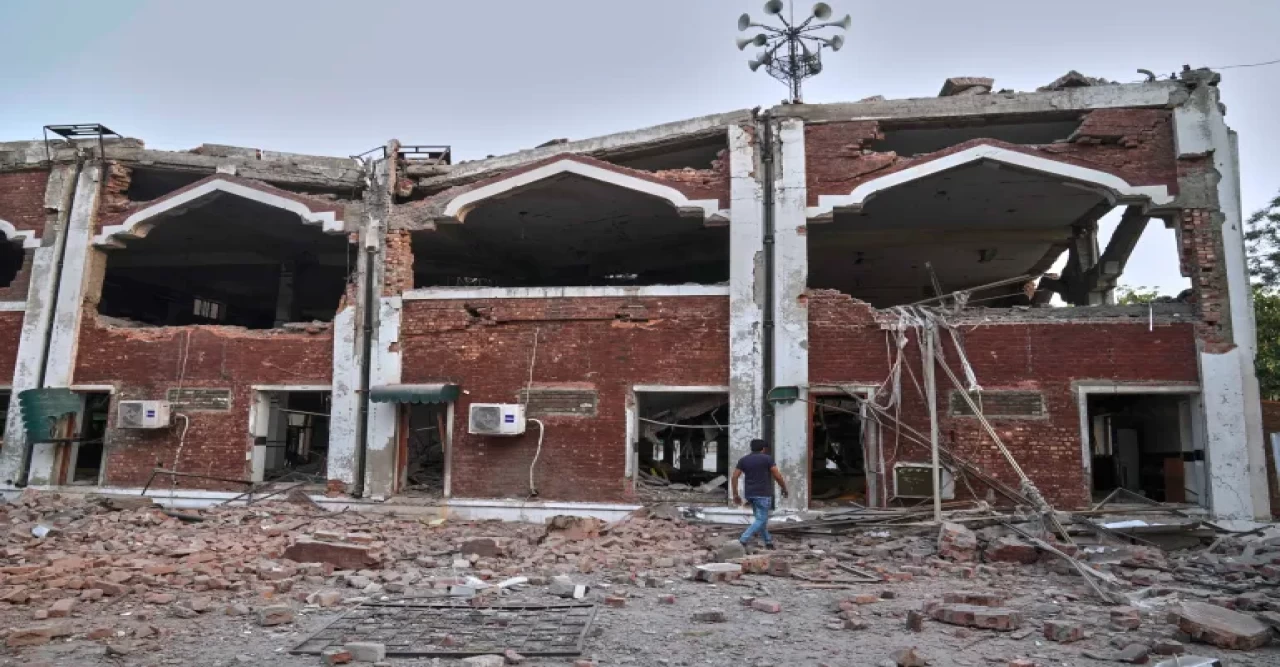Dr. Pamelia Riviere
Kashmir is one of the world’s most dangerous crossroads, partially controlled by India and Pakistan, both of which claim it in its entirety. The two nuclear-armed rivals have fought three wars over this mountainous territory. The latest escalation, “Operation Sindoor,” follows the massacre of 26 civilians in Indian-controlled Kashmir last month by gunmen. India accused Pakistan of involvement and vowed to retaliate against those it deemed responsible. Islamabad denied the accusations. Tensions have been escalating between the two nuclear-armed nations since a deadly attack in Indian-administered Kashmir’s Pahalgam on April 22, which India attributes to Pakistan. Pakistan denies any involvement.
The situation has sharply escalated between India and Pakistan, with both sides exchanging heavy fire along the line of control that separates Pakistan-administered Kashmir from Indian-administered Kashmir, as reported in the media. A total of eight people were killed, including children, and 35 were injured, according to Pakistan’s military spokesperson, after India launched military strikes on targets in Pakistan early Wednesday. India targeted six locations with 24 strikes in both Pakistan and Pakistan-administered Kashmir, spokesperson Lt. Gen. Ahmed Sharif Chaudhry stated in a news conference..jpg) Previously, Pakistan reported that five locations had been struck. India has claimed that nine sites were targeted in total. Five people were killed, including a 3-year-old girl, in Ahmadpur East, located in Pakistan’s Punjab Province, Chaudhry reported. One man was also killed in Punjab’s Muridke, a city near Lahore, the capital of the province. In Pakistan-administered Kashmir, a 16-year-old girl and an 18-year-old man were killed in the city of Kotli, he added. According to the military spokesperson, mosques were among the targets of the strikes, CNN reported. However, CNN could not independently verify the claims above.
Previously, Pakistan reported that five locations had been struck. India has claimed that nine sites were targeted in total. Five people were killed, including a 3-year-old girl, in Ahmadpur East, located in Pakistan’s Punjab Province, Chaudhry reported. One man was also killed in Punjab’s Muridke, a city near Lahore, the capital of the province. In Pakistan-administered Kashmir, a 16-year-old girl and an 18-year-old man were killed in the city of Kotli, he added. According to the military spokesperson, mosques were among the targets of the strikes, CNN reported. However, CNN could not independently verify the claims above.
War history of Pakistan and India, focusing on Kashmir and Bangladesh India, which has a Hindu majority, and Pakistan, predominantly Muslim, each control parts of Kashmir but claim the entire region, having fought three wars over the territory. In 1947, India and Pakistan gained independence from Great Britain. The ruler of Kashmir initially decided to remain independent, opting not to join either Pakistan or India. After militants from Pakistan invaded, he signed a letter acceding to India. Pakistan did not recognize this letter as a legal document, igniting conflict. In 1949, the two countries agreed to withdraw all troops behind a mutually accepted ceasefire line, later known as the Line of Control. In 1965, India and Pakistan went to war again over Kashmir. The conflict did not resolve the territorial dispute. In 1971, the largest war was fought between the two countries, resulting in a humiliating loss for Pakistan and the creation of Bangladesh from the region formerly known as East Pakistan. In 1999, India and Pakistan engaged in a limited border conflict in Kashmir after armed invaders from Pakistan crossed the Line of Control in Kargil. In 2025, India's strikes against Pakistan represent the most significant incursion New Delhi has made into Pakistan's undisputed borders of Kashmir since the Indo-Pakistani War of 1971. On Wednesday, May 06, 2025, Pakistan reported that India targeted five locations, with three in Pakistan-administered Kashmir and two in Punjab province. India’s army has launched "Operation Sindoor,” targeting nine sites in Pakistan and Pakistan-administered Kashmir. India announced “Operation Sindoor” on Wednesday, May 6th, 2025, striking “terrorist infrastructure” in both Pakistan and Pakistan-administered Kashmir, representing a significant escalation that risks spiralling into an all-out conflict between the two neighbours.
In 1999, India and Pakistan engaged in a limited border conflict in Kashmir after armed invaders from Pakistan crossed the Line of Control in Kargil. In 2025, India's strikes against Pakistan represent the most significant incursion New Delhi has made into Pakistan's undisputed borders of Kashmir since the Indo-Pakistani War of 1971. On Wednesday, May 06, 2025, Pakistan reported that India targeted five locations, with three in Pakistan-administered Kashmir and two in Punjab province. India’s army has launched "Operation Sindoor,” targeting nine sites in Pakistan and Pakistan-administered Kashmir. India announced “Operation Sindoor” on Wednesday, May 6th, 2025, striking “terrorist infrastructure” in both Pakistan and Pakistan-administered Kashmir, representing a significant escalation that risks spiralling into an all-out conflict between the two neighbours.
India defended its military operation in Pakistan on Wednesday, claiming that its actions were “focused and precise." “They were measured, responsible and designed to be non-escalatory in nature," the Embassy of India said in a statement. "No Pakistani civilian, economic or military targets have been hit. Only known terror camps were targeted.” Pakistan reported that eight people were killed, including children, in what the prime minister described as “an act of war.” Pakistan also indicated that five Indian Air Force planes and a drone were shot down during the attack. India has not confirmed the fighter jet losses. Pakistan stated that India’s missile attacks on six locations killed at least eight people and wounded more than 35, promising a robust response to the “act of war” from its neighbour. Pakistani security sources claim that three of the five Indian planes they downed were Rafale fighter jets. These jets are valuable assets of the Indian Air Force, which acquired them only several years ago as New Delhi sought to strengthen its military. The Rafale is not a stealth jet, but is marketed as having a low profile that is not easily detectable on radar.
It also offers one distinct advantage — combat experience. According to Dassault Aviation's website, the Rafale jets have been deployed in Afghanistan, Libya, Mali, Iraq, and Syria operations. There has been no official statement from India regarding the claims made by Pakistani officials that several Indian warplanes were downed during the overnight clashes. However, India’s army reports that three civilians were killed overnight by Pakistani artillery fire. The Pakistani military “resorted to arbitrary firing” across the Line of Control, the de facto border dividing Kashmir, the army stated in a statement. “Three innocent civilians lost their lives in indiscriminate firing/shelling,” the army said, adding that Indian forces were “responding proportionately.”
The Analysts' concern about aggressive nationalism Aggressive nationalism and the radical nature of religiosity are evident in India’s diplomacy, particularly concerning Pakistan and the Kashmir territory. This type of nationalism promotes a highly assertive and often expansionist foreign policy, prioritizing national interests above all else and possibly resorting to aggressive or violent tactics to achieve these objectives. Aggressive nationalism can manifest as a belief in one's nation's inherent superiority and a willingness to use force or intimidation to achieve national goals. India and Pakistan, two neighbours with a long history of conflict, are in dangerous territory, analysts warn, as Islamabad vows to retaliate against New Delhi’s strikes, which raises the risk that tit-for-tat responses could spiral into an all-out war. Wednesday’s operation inside Pakistan represents the deepest incursion India has made into its neighbour since the Indo-Pakistan War of 1971, the most significant conflict between the two countries. India’s decision to strike comes more than two weeks after 26 people, mostly Indian civilians, were massacred in an attack in Indian- administered Kashmir.
New Delhi blamed Islamabad for the assault, a claim that Pakistan has denied since the Pahalgam attack. Pakistan has stated that any attempt by India to divert the waters of the major rivers on the western side of the Indus River chain, including the Chenab, will be regarded as an act of war. The Indians have already engaged in such actions. We have reports that at least one major river, the Chenab, is being withheld from release by the Indians, who claim they will not release that water. This water issue could escalate the conflict, as it poses an existential threat. Pakistan is an agricultural country that relies on river sources. “If the war escalates, even if not to the nuclear threshold, it is very likely to hold grave consequences for Indians and Pakistanis alike, as well as the broader region and the world,” said Derek J. Grossman, a senior defense analyst at the RAND Corporation, a US-based think tank, as reported by CNN. Pakistan’s Ministry of Foreign Affairs has issued a strongly worded statement accusing India of carrying out an “unprovoked and blatant act of war.” “India’s act of aggression has resulted in the martyrdom of civilians, including women and children,” the statement says. It further states, “Pakistan reserves the right to respond appropriately at a time and place of its choosing, by Article 51 of the UN Charter, and as enshrined in international law.
The government, armed forces, and people of Pakistan stand united against Indian aggression. They will always act with unyielding resolve to protect and preserve the sovereignty and territorial integrity of Pakistan. Escalation, provocation, and alertness The chief minister of Pakistan’s Punjab province has requested that hospitals in the region stay alert and has ordered schools to remain closed on Wednesday. Meanwhile, educational institutions, including schools and colleges, will be closed today across Indian territories such as Jammu, Samba, Kathua, Rajouri, and Poonch, “given the prevailing situation,” according to Divisional Commissioner Jammu. India’s strikes against Pakistan follow more than two weeks of increasing pressure on Indian Prime Minister Narendra Modi to respond forcefully to his neighbour after a tourist massacre in Indian- administered Kashmir.
Narendra Modi spoke openly about retaliation, emphasizing his nationalistic party and Indian nationalism. The Indian public also chanted slogans regarding the retaliation of 260 bodies against 26 bodies. Narendra Modi governs a proud, nationalistic nation that believes in the power of revenge against Pakistan. Following the massacre, India’s media reacted excessively and immediately called for blood revenge. The Indian army posted on X after the missiles were launched, “Justice is served.” Nonetheless, Pakistan consistently denied the attack and asserted that India’s homegrown terrorists carried out the massacre. There was no evidence that Paksitan was directly or indirectly involved in the killings in Pahalgam. Maryam Nawaz Sharif, Punjab’s chief minister, announced that she had issued emergency response orders for Punjab. Sharif stated that Pakistan desired peace but would become “a legion” if war was forced upon it. “India started it, we’ll finish it,” she wrote on X, adding that the entire nation stands with the Pakistani military. US Condemns India, UAE asks for restraints. US Democratic Senator Jeanne Shaheen, a top member of the Senate Foreign Relations Committee, says she is “gravely concerned” by the “military escalation between India and Pakistan.” “I implore the two governments to exercise restraint and prioritize diplomatic engagement,” she said.
he United Arab Emirates is urging India and Pakistan “to exercise restraint, de-escalate tensions, and avoid further escalation that could threaten regional and international peace,” according to a statement from UAE Deputy Prime Minister of Foreign Affairs Sheikh Abdullah bin Zayed Al Nahyan. United Nations Secretary-General António Guterres also condemned the April attack in Kashmir and urged India and Pakistan to “avoid a military confrontation that could easily spin out of control.” In a post on X, Guterres wrote, "Make no mistake: A military solution is no solution," noting that tensions between the two neighbours are “at their highest in years.” United States President Donald Trump called India’s confirmed military operation against Pakistan “a shame” and stated that he only learned of the news shortly before his Oval Office event on Tuesday evening. “It’s a shame. We just heard about it, just as we were walking in the doors of the Oval, just heard about it. I guess people knew something was going to happen based on a little bit of the past. They’ve been fighting for a long time, you know; they’ve been fighting for many, many decades and centuries,” the president said after overseeing the swearing-in ceremony for his special envoy, Steve Witkoff. “I just hope it ends very quickly,” Trump said.
Homegrown Terrorists, or Sabotaged? In response to the recent violence in Kashmir, Pakistan has stated that the attackers have been identified as homegrown terrorists operating in the region. The Kashmir incident reminds us of the 2016 Holy Artisan Bakery attack in Dhaka, which also involved young individuals from English-medium secondary schools. The persistent cycle of violence continues to result in innocent victims suffering. Pakistan's Defence Minister, Khawaja Asif, has categorically denied Indian allegations linking Pakistan to the Kashmir incident, instead labelling it as an expression of "homegrown resistance" within the occupied territory. Asif pointed out the long-standing, unresolved nature of UN resolutions concerning Kashmir, which have been in place for decades. He accused India of trying to divert attention from its own human rights violations under Prime Minister Modi's government. He also expressed concerns about the potential for Indian cross-border retaliation. He stressed that Pakistan is prepared to respond to any aggression, referencing the downing of an Indian Air Force jet by Pakistani forces in February 2019 amid rising tensions between the two nuclear-armed nations. Asif dismissed any claims suggesting the involvement of Pakistan's army chief in recent events as unfounded, reiterating that Kashmir is pivotal to Pakistan's national identity.
Additionally, he raised the possibility of "false flag" operations by India to justify military actions and urged the international community to acknowledge the nuclear risks associated with the ongoing conflict. Throughout the discussion, Asif emphasized Pakistan's commitment to providing diplomatic support for the Kashmiri people while denying any affiliations with militant groups. Asif concluded the interview by asserting that the Kashmir issue transcends political concerns and represents an existential challenge for Pakistan. He urged the international community and world leaders to intervene and help mitigate regional conflict in light of current tensions. Days of military exchanges between India and Pakistan have ignited the most serious crisis in years in the disputed Kashmir border region. Pakistan has threatened war after India accused it of a deadly terrorist attack in Kashmir. To minimize the scale of the war, a UN investigation would be beneficial to determine whether homegrown terrorists perpetrated the violence or if it was sabotaged. Furthermore, India should exercise caution and avoid an aggressive nationalist approach by imposing selective retaliation on the people of Kashmir, particularly targeting the Muslim community, as observed in Israel's actions towards the Palestinians in Gaza.
Such measures could exacerbate existing tensions and perpetuate a cycle of violence and resentment. Instead, it is crucial to pursue avenues of dialogue and understanding that respect the rights and identities of all communities within Kashmir, fostering a peaceful resolution that acknowledges the region's complex historical and socio-political dynamics. Taking a more inclusive approach could help rebuild trust and promote harmony among the diverse populations in Kashmir. Together, peace advocates must champion their rights and support their pursuit of justice and reconciliation in this region. Diplomacy and dialogue are the most effective means of peacefully resolving crises and achieving nations' shared aspirations for peace, stability, and prosperity. India must avoid collective punishment similar to that of Israel (Genocide in Gaza) and Pakistan (Genocide in Bangladesh) to prevent carnage.
Pamelia Riviere is a freelance writer and an analyst.



.jpg)







